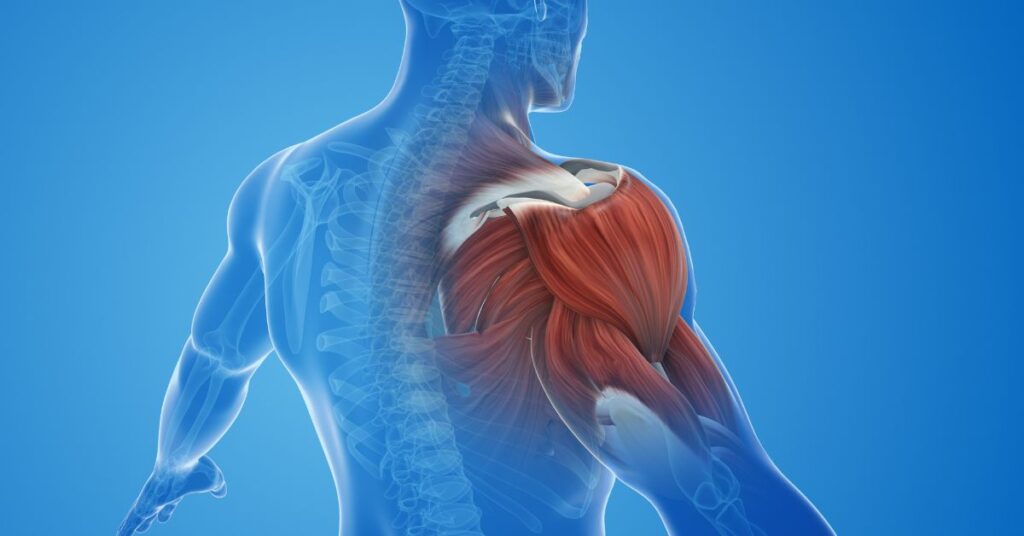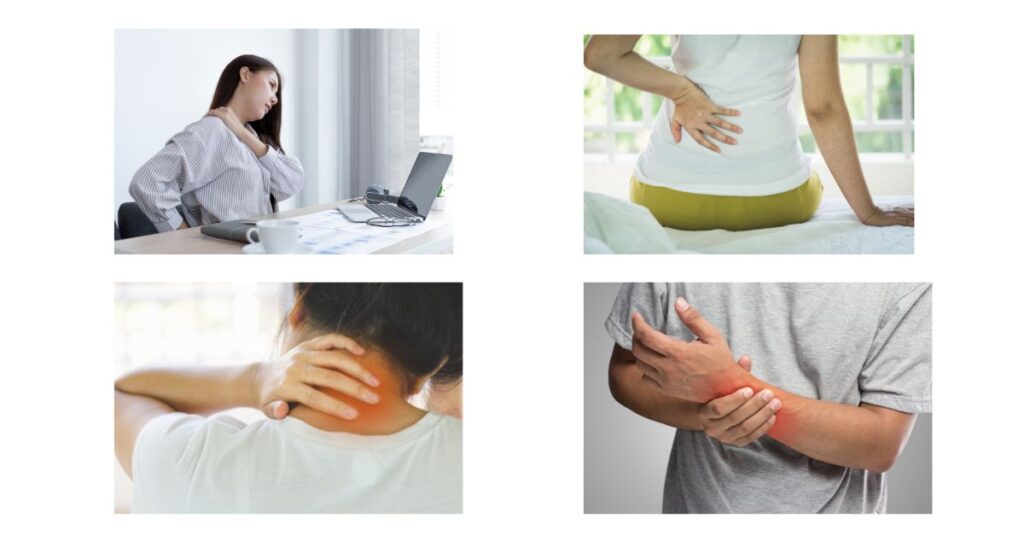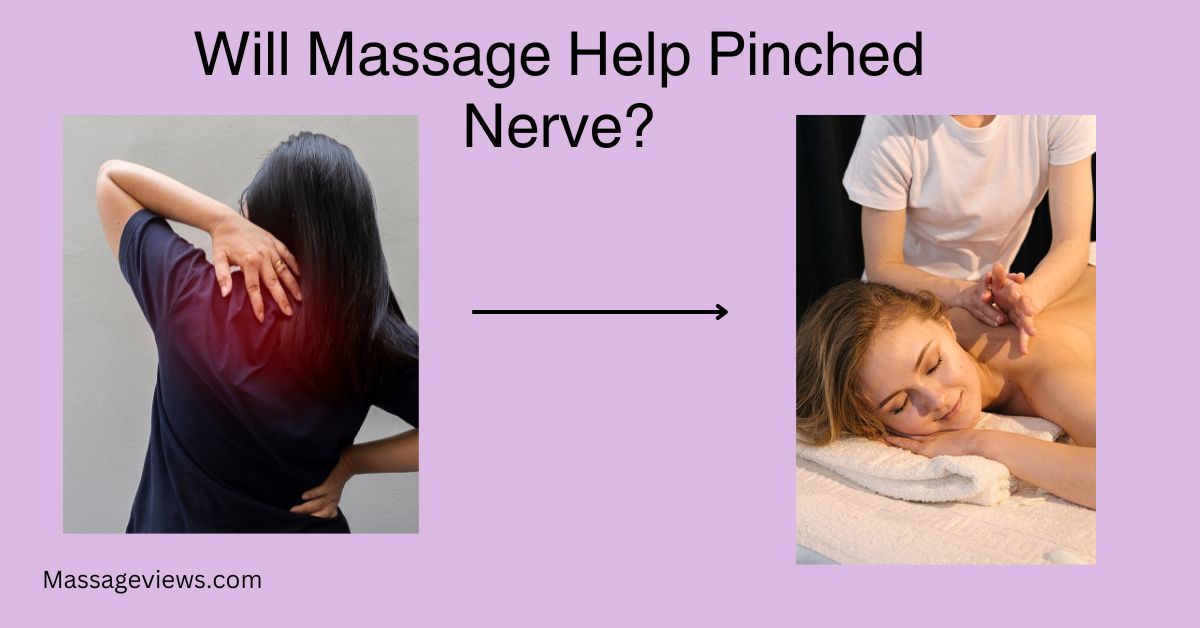Have you suffered from pinched nerve pain and discomfort? If so, you might be looking for different approaches to get well. A lot of people look to massage therapy as a possible fix, but does it truly assist relieve pinched nerve symptoms?
Extreme discomfort and disruption to regular activities can result from pinched nerves. Looking into alternative therapies, like massage therapy, might be helpful in addition to getting medical attention as needed. But, before spending time and money on this kind of treatment, it’s critical to determine whether can actually massage help pinched nerve.
Massage therapy has been touted for its ability to reduce pain and inflammation, improve blood flow, and promote relaxation. But can it effectively target and alleviate the symptoms of a pinched nerve? lets find it.
Table of Contents
What causes a pinched nerve?

Pinched nerves can occur due to various factors, with the most common causes being nerve compression in the spine and inflammation or injury in surrounding muscles and tissues.
Nerve compression in the spine
- Herniated disc: When the soft material inside a spinal disc protrudes and presses on a nearby nerve, it can lead to nerve compression and subsequent symptoms.
- Spinal stenosis: This condition involves the narrowing of the spinal canal, which can put pressure on the nerves traveling through the spine, causing discomfort.
- Bone spurs: Overgrowth of bone, often due to osteoarthritis, can lead to the formation of bone spurs that may impinge on nearby nerves, resulting in a pinched nerve.
Inflammation or injury in surrounding muscles/tissues:
In addition to spinal issues, pinched nerves can also result from inflammation or injury in the muscles or tissues surrounding the nerves.
- Repetitive motion: Engaging in repetitive activities or motions, such as typing or lifting heavy objects, can cause inflammation and swelling in the surrounding tissues, leading to nerve compression.
- Trauma: Accidents or injuries, such as falls or sports-related impacts, can result in direct trauma to the nerves or surrounding tissues, leading to pinched nerve symptoms.
Further reading: When massage is painful?
Pinched nerve symptoms to watch for
It is essential to identify the signs of a pinched nerve in order to take prompt action and provide good care. The following are some typical indications and symptoms of this illness:
Sharp, shooting pain in the affected nerve pathway
Sharp, shooting pain that travels along the length of the injured nerve is one of the main signs of a pinched nerve. The degree of this pain might vary, from moderate discomfort to excruciating, incapacitating pain. Certain motions or activities that exacerbate the compressed nerve may make the sensation worse.
Numbness or tingling in the hands, arms, legs, or feet
Pinched nerves are frequently accompanied by paresthesia, or numbness or tingling feelings. The hands, arms, legs, or feet are among the parts of the body that the injured nerve supplies with these feelings. The intensity of numbness and tingling varies and might be either intermittent or continuous.

Muscle weakness in the affected area
Pinched nerves can lead to muscle weakness in the regions served by the compressed nerve. This weakness may manifest as difficulty gripping objects, dropping items unexpectedly, or experiencing unexplained weakness in the affected limbs. Muscle weakness associated with a pinched nerve can impact daily activities and reduce overall mobility.
Changes in reflexes
In some cases, pinched nerves can affect reflexes in the affected areas. Diminished or exaggerated reflex responses may occur, indicating nerve dysfunction. Changes in reflexes may be subtle and require assessment by a healthcare professional to detect.
Radiating pain
Pain may spread from the site of compression to other parts of the body as a result of pinched nerves. Sciatica, for instance, is a condition where pain travels down the leg due to a pinched nerve in the lower back. Along the nerve system, radiating pain can spread and get worse with specific motions or postures.
Sensory disturbances
Sensory abnormalities including hypersensitivity or hyposensitivity to pressure, temperature, or touch can also result from pinched nerves. The affected limb’s capacity to appropriately perceive sensory cues may be compromised by these sensory alterations, which may coexist with numbness and tingling sensations.
Can massage therapy help a pinched nerve?

A common complementary strategy for treating pinched nerve problems is massage treatment. It’s critical to recognize its limitations in treating the condition’s underlying cause, even though it could offer momentary respite and relaxation.
May provide temporary pain relief and relaxation
By encouraging relaxation and easing muscle tension in the affected area, massage therapy can help reduce discomfort associated with pinched nerves. During a massage, the soft tissues are gently worked on to assist loosen up tense muscles. This relieves pressure on the pinched nerve and brings about momentary comfort. Many people discover that receiving a massage helps them feel more comfortable overall and provides instant pain relief.
Helps improve blood flow and reduce muscle tension around the compressed nerve
Improved circulation and blood flow to the injured area are encouraged by massage therapy, which can help lower inflammation and accelerate recovery. Massage supports the tissues surrounding the compressed nerve by improving circulation, which promotes the tissues’ healing and lessens stiffness. It also helps provide oxygen and nutrients to those tissues. Furthermore, by focusing on particular muscle groups, massage treatments can release tension and relieve pressure on the pinched nerve, increasing relaxation and pain relief.
Does not treat the actual nerve compression
It’s important to note that while massage therapy can effectively manage pinched nerve symptoms, it does not directly address the underlying cause of nerve compression. Massage primarily focuses on providing symptomatic relief by addressing muscle tension and promoting relaxation. Therefore, while massage may offer temporary relief from pain and discomfort, it’s essential to seek comprehensive treatment to address the root cause of the pinched nerve.
Tips for using massage for a pinched nerve
Here are some tips for incorporating massage therapy into your treatment plan:
See a licensed massage therapist experienced with this issue:
Selecting a certified massage therapist with experience treating patients with comparable issues is crucial when considering massage treatment for a pinched nerve. A licensed massage therapist may evaluate your unique complaints and modify the massage techniques to best meet your needs. Based on your unique circumstances, they can also offer advice on how often and how long to get massages.
Avoid massage directly on the affected nerve:
While massage can help alleviate muscle tension and promote relaxation, it’s crucial to avoid applying direct pressure or manipulation to the affected nerve itself. Directly massaging the pinched nerve can exacerbate symptoms and potentially cause further irritation. Instead, focus on gentle techniques that target the surrounding muscles and tissues to alleviate pressure on the nerve without aggravating the condition.
Try gentle Swedish massage techniques to relax muscles:
Swedish massage techniques, such as effleurage (long, sweeping strokes), petrissage (kneading), and gentle stretching, can help relax tight muscles and improve circulation around the compressed nerve. These gentle techniques promote relaxation and pain relief without placing excessive strain on the affected area. Communicate with your massage therapist about any discomfort or sensitivity during the session to ensure a comfortable experience.
Communicate any discomfort to your massage therapist:
To ensure a safe and successful treatment session, you and your massage therapist must communicate openly. Please let your therapist know right away if you feel uncomfortable or if your symptoms get worse while receiving a massage. In order to avoid any negative effects and better meet your demands, they can modify the pressure, technique, or target regions. Their major priority are you and your comfort.
Including massage therapy in your treatment plan for pinched nerves can help alleviate symptoms even more and enhance general wellbeing. To effectively treat the underlying cause of the pinched nerve, however, massage treatment must be combined with complete medical care.
Conclusion
It’s important to keep in mind that massage therapy does not treat the underlying cause of pinched nerve sensations, even though it can provide momentary relief and encourage relaxation. To relieve compression and stop subsequent problems, pinched nerves frequently need extensive medical care.
It’s important to speak with a healthcare provider if you’re feeling pain, numbness, or weakness in your muscles as these are signs of a pinched nerve that need to be properly diagnosed and treated. Your physician can advise on suitable measures, such as medication, physical therapy exercises, bed rest, or, in extreme circumstances, surgery.
Make sure you see a professional massage therapist with experience treating nerve-related conditions when implementing massage therapy into your treatment plan for pinched nerves. To guarantee a secure and productive session, be honest with your therapist about your symptoms and any discomfort you may be feeling.
Recall that although massage therapy might alleviate symptoms, it is only one part of treating a pinched nerve. You can try to reduce pain and enhance your general quality of life by combining massage therapy with medical care and lifestyle changes.
Don’t be afraid to ask your healthcare practitioner any questions or concerns you may have about using massage therapy to treat a pinched nerve. You can work with me to create a detailed plan that will meet your individual needs and encourage the best possible healing.
While you travel the path to pinched nerve rehabilitation, take care of yourself and place a high priority on your health and wellbeing.
